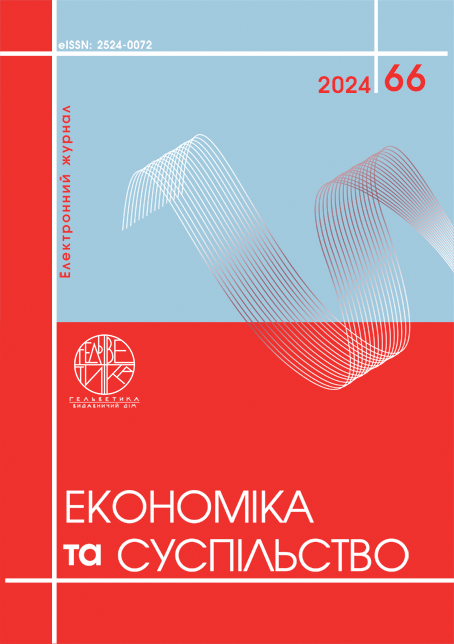IMPACT OF DIGITAL TRANSFORMATION OF BUSINESS ON CONSULTING SERVICES IN THE SPHERE OF INFORMATION AND COMMUNICATION TECHNOLOGIES
Abstract
The article assesses the impact of business digital transformation on the development of consulting services in the information and communication sector and the changes in their functionality within the structure of the digital economy. The main stages and current trends in the development of the digital economy and its technological foundations are reviewed. The transition of the digital society from the "Industry 4.0" strategy to the "Society 5.0" strategy is substantiated. It is determined that the main trend of the digital economy is the comprehensive implementation of the principles of the shared economy. Within the business processes of the shared economy, there is an expansion of management consulting tools. This is facilitated by the provision of consulting and information services based on digital eco-platforms and ecosystems. It is found that these platforms have the technological capabilities to engage consumers and create shared economy business models. Moreover, the innovative business models of the digital economy have a high level of security for storing and using personal data. An analytical review and assessment of changes in the country's GDP structure over the recent years of rapid digitalization are presented. The country's GDP structure, in terms of the distribution of service output, indicates that consulting services in the information and telecommunications sector have high indices, which confirms the significant role of ICT consulting services. A distinctive feature of the digital economy is the focus of economic activity on eco-platforms, which are digital environments with a set of functions and services that meet the needs of consumers and producers, while also enabling direct interaction between them. It is proven that as a result of organizing such interaction, the role and functionality of consulting services in the ICT sector are changing. The analysis allowed for the identification and justification of changes in the functionality of consulting services in the context of the digital economy, directly linked to the development of information and communication services and the implementation of innovative digital methodologies for managing IT companies. The results of the study made it possible to conclude and justify the importance of consulting services within the structure of information and communication technologies.
References
2. Tapscott, D. The Digital Economy: Promise and Peril In The Age of Networked Intelligence. NY : McGraw-Hill, 1994. 368 p.
3. Lane, N. Advancing the digital economy into the 21st century. Information Systems Frontiers. 1999. Vol. 1. No. 3. P. 317–320.
4. Mesenbourg T. L. Measuring the Digital Economy // U.S. Bureau of the Census. URL: https://www.census.gov/content/dam/Census/library/working-papers/2001/ econ/digitalecon.pdf
5. Україна 2030Е – країна з розвинутою цифровою економікою. URL: https://strategy.uifuture.org/kraina-z-rozvinutoyu-cifrovoyu-ekonomikoyu.html#6-2-5
6. Чукурна О.П., Тардаскіна Т.М. Менеджмент в цифровій економіці: навчальний посібник. Одеса : Астропринт, 2024. 376 с.
7. Державний комітет статистики України. URL: https://www.ukrstat.gov.ua/
8. Dahlman, C., Mealy S., Wermelinger M. Harnessing the Digital Economy for Developing Countries: Working Paper No. 334. Paris: OECD, 2016 // OECD URL: http://www.oecd-ilibrary.org/docserver/download/4adffb24-en.pdf
9. The Digital Economy. London: British Computer Society, 2014 // BCS. URL: http://policy.bcs.org/sites/policy.bcs.org/files/digital%20economy%20Final%20version_0.pdf
10. Rouse M. Digital Economy // Newton: Techtarget. URL: http://searchcio.techtarget.com/definition/digital-economy
11. Digital Economy / Oxford: Oxford University Press, 2017 // Oxford Dictionary. URL: https://en.oxforddictionaries.com/definition/digital_economy
1. Negroponte, N. Being Digital. NY : Knopf, 1995. 256 p.
2. Tapscott, D. The Digital Economy: Promise and Peril In The Age of Networked Intelligence. NY : McGraw-Hill, 1994. 368 p.
3. Lane, N. Advancing the digital economy into the 21st century. Information Systems Frontiers. 1999. Vol. 1. No. 3. P. 317–320.
4. Mesenbourg T. L. Measuring the Digital Economy // U.S. Bureau of the Census. Available at: https://www.census.gov/content/dam/Census/library/working-papers/2001/ econ/digitalecon.pdf
5. Ukraine 2030E is a country with a developed digital economy. Available at: https://strategy.uifuture.org/kraina-z-forovovoyu-cifrovoyu-ekonomikoyu.html#6-2-5
6. Chukurna O.P., Tardaskina T.M. Management in the digital economy: a study guide. Odesa: Astroprint, 2024. 376 p.
7. State Statistics Committee of Ukraine. Available at: https://www.ukrstat.gov.ua/
8. Dahlman, C., Mealy S., Wermelinger M. Harnessing the Digital Economy for Developing Countries: Working Paper No. 334. Paris: OECD, 2016 // OECD Available at: http://www.oecd-ilibrary.org/docserver/download/4adffb24-en.pdf
9. The Digital Economy. – London: British Computer Society, 2014 // BCS. Available at: http://policy.bcs.org/sites/policy.bcs.org/files/digital%20economy%20Final%20 version_0.pdf
10. Rouse M. Digital Economy // Newton: Techtarget. Available at: http://searchcio.techtarget.com/definition/digital-economy
11. Digital Economy / Oxford: Oxford University Press, 2017 // Oxford Dictionary. Available at: https://en.oxforddictionaries.com/definition/digital_economy
Copyright (c) 2024 Олена Чукурна, Сергій Базика, Олександр Федчик

This work is licensed under a Creative Commons Attribution 4.0 International License.


